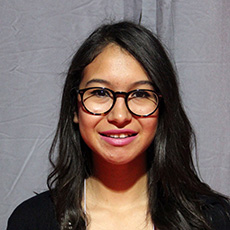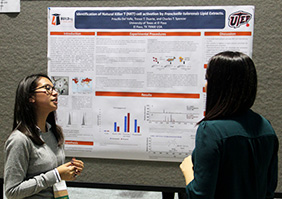This is the third post in a new series highlighting NIGMS’ efforts toward developing a robust, diverse and well-trained scientific workforce.

Credit: Christa Reynolds.
Academic Institution: The University of Texas at El Paso
Major: Microbiology
Minors: Sociology and Biomedical Engineering
Mentor: Charles Spencer
Favorite Book: The Immortal Life of Henrietta Lacks, by Rebecca Skloot
Favorite Food: Tacos
Favorite music: Pop
Hobbies: Reading and drinking coffee
It’s not every day that you’ll hear someone say, “I learned more about parasites, and I thought, ‘This is so cool!’” But it’s also not every day that you’ll meet an undergraduate researcher like 21-year-old Priscilla Del Valle.
BUILD and the Diversity Program Consortium
The Diversity Program Consortium (DPC) aims to enhance diversity in the biomedical research workforce through improved recruitment, training and mentoring nationwide. It comprises three integrated programs—Building Infrastructure Leading to Diversity (BUILD), which implements activities at student, faculty and institutional levels; the National Research Mentoring Network (NRMN), which provides mentoring and career development opportunities for scientists at all levels; and the Coordination and Evaluation Center (CEC), which is responsible for evaluating and coordinating DPC activities.
Ten undergraduate institutions across the United States have received BUILD grants, and together, they serve a diverse population. Each BUILD site has developed a unique program intended to engage and prepare students for success in the biomedical sciences and maximize opportunities for research training and faculty development. BUILD programs include everything from curricular redesign, lab renovations, faculty training and research grants, to student career development, mentoring and research-intensive summer programs.
Del Valle’s interest in studying infectious diseases and parasites is motivating her to pursue an M.D./Ph.D. focusing on immunology and pathogenic microorganisms. Currently, Del Valle is a junior at The University of Texas at El Paso (UTEP)’s BUILDing SCHOLARS Center. BUILDing SCHOLARS, which stands for “Building Infrastructure Leading to Diversity Southwest Consortium of Health-Oriented Education Leaders and Research Scholars,” focuses on providing undergraduate students interested in the biomedical sciences with academic, financial and professional development opportunities. Del Valle is one of the first cohort of students selected to take part in this training opportunity.
BUILD scholars receive individual support through this training model, and Del Valle says she likes “the way that they [BUILDing SCHOLARS] take care of us and the workshops and opportunities that we have.”
Born in El Paso, Texas, Del Valle moved to Saltillo, Mexico, where she spent most of her childhood. Shortly after graduating from high school, she returned to El Paso to start undergraduate courses at El Paso Community College (EPCC), to pursue an M.D. Del Valle explains that in Mexico, unlike in the United States, careers in medical research are not really emphasized in the student community or in society, so she did not have firsthand experience with research.
Del Valle discovered her passion for research when she was assigned a project on malaria as part of an EPCC course. She was fascinated by the parasite that causes malaria. “It impressed me how something so little could infect a person so harshly,” she says.

This experience spurred Del Valle to apply to the Research Initiative for Scientific Engagement (RISE) program at EPCC, where she conducted research and published her findings through the Texas AgriLife Research and Extension Center in El Paso, an extension of Texas A&M University. Del Valle transferred to UTEP at the start of her sophomore year, after she was awarded a BUILDing SCHOLARS research traineeship.
As an avid researcher and scientist, Del Valle is a great fit for BUILDing SCHOLARS. She has served as both a peer mentor and enhanced her research skills through innovative, research-driven courses; and will be presenting at the Southwestern Social Science Association annual meeting in April. And if that’s not enough, Del Valle conducts research—which she started a year sooner than the program required—in Charles Spencer’s microbiology lab.
Broadly, the lab studies how the immune system responds to infection-causing bacteria, such as those that cause tuberculosis, leprosy and food poisoning. As an undergraduate, Del Valle receives a balance of research independence and helpful guidance.
After learning how to extract lipids (fatty molecules) from cells, Del Valle was tasked with teaching the technique to other students in the lab. This extraction is an important part of her research on Francisella tularensis, the bacterium that causes tularemia, sometimes called “rabbit fever.” This disease can be transmitted to humans or other mammals if they are bitten by infected ticks and deer flies, drink water contaminated by infected animal carcasses, come into contact with infected animals or breathe in the bacteria. If left untreated, the bacterial infection can result in severe respiratory illness, including life-threatening pneumonia, and body-wide infection.
Spencer’s lab hypothesizes that certain cells of the immune system detect and respond to a particular lipid made only by the F. tularensis bacteria and not by our own cells. The lab researchers are investigating how the body launches a counterattack against F. tularensis by mobilizing natural killer T cells, a type of white blood cell. Del Valle’s research strives to identify the lipid that is made by F. tularensis and recognized by natural killer T cells. This research aims to help scientists better understand how the body reacts to infectious disease. It may also lead to a new treatment for tularemia infection by paving the way for a drug that resembles a lipid that can activate natural killer T cells to fight infection.
Even when she’s not in the lab, Del Valle likes learning about science and research. One of her favorite books is The Immortal Life of Henrietta Lacks, which describes how specific cells from Henrietta Lacks, known as HeLa cells, were used to develop the polio vaccine and led to other scientific discoveries. The book also discusses ethical issues, such as ensuring research study volunteers fully understand a study’s purpose before they agree to participate. Del Valle enjoys reading about these topics because she sees them as crucial to her future career as a scientist.
In the spring of 2018, Del Valle will graduate with a bachelor’s degree in microbiology and minors in sociology and biomedical engineering. As she continues her research and works toward her academic goals of earning a M.D./Ph.D., Del Valle plans to refine her interest in immunology and focus on a specific disease-causing microorganism.
Because of differences between the United States and Mexico in how medicine and the sciences are taught, Del Valle sometimes has to explain to her family why she wants to pursue research instead of working toward being a “medical doctor.” Nonetheless, her family is proud of her accomplishments and supports her.
Del Valle’s unquenchable desire to learn has already brought her across borders and around obstacles, and she’s looking forward to the next steps in her research career.


Very inspiring blog how the younger generation of kids can shine if they are focused and work hard!
Isn’t it too bad that there is a shortage of “Doctors” in the USA, rather than a shortage of “researchers”?